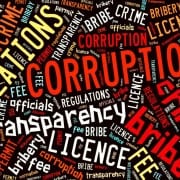|
Getting your Trinity Audio player ready...
|
 By Valencia Talane
By Valencia Talane
South Africa is not doing enough to bring to book individuals and companies linked to acts of bribery involving foreign companies and governments. Furthermore, the country’s “political and economic considerations” are thought to be contributing to this worrying state of affairs.
This was recently revealed by the Organisation for Economic Co-operation and Development (OECD) in a new report released by the OECD's working group on bribery. Titled Phase 3 Report on Implementing the OECD Anti-bribery Convention in South Africa, it paints an unflattering picture of the country’s feeble efforts to combat foreign bribery.
So little has been done, in fact, that as few as six cases have received attention from the South African authorities, even though they are in the “preliminary investigation” stage, by the admission of those authorities. These form part of a total of 10 cases that have been taken on since South Africa became part of the OECD Anti-bribery Convention in 2007.
The new report is the fourth on the topic – the first, published in June 2008, was a phase one review of the implementation in South Africa of the convention. It was followed in June 2010 by a phase two report evaluating the effectiveness of the implementation and making recommendations, and a follow-up to this second report, submitted by South Africa in September 2012. Even at that stage the OECD was already expressing concern that there were no prosecutions – a matter, it noted, that “could be addressed if South Africa adopted a more proactive approach to the investigation and prosecution of this type of crime”.
However, the last few years have produced nothing that is new and encouraging.
Work in progress
Increasingly, South African companies are expanding their operations beyond the country's borders. One case that has received plenty of media attention locally and abroad involves mobile network giant MTN and its battle with Turkcell, a Turkish competitor who accused the South African company of bribing officials in both South Africa and Iran to help it win a licence in the Gulf state.
Turkcell first sued MTN in the US Supreme Court in 2012, only to withdraw the charges in May of the following year. In November 2013, five months after the charges were dropped, the Turkish communications provider reinstated the charges in the South Gauteng High Court in Johannesburg. MTN owns 49% of Iran’s Irancell, a licence it obtained in 2005 and which Turkcell claims it had obtained prior to MTN.
According to OECD researchers, none of the cases in the South African investigations system are anywhere near the stage where the individuals involved – local or foreign – can be prosecuted.
In another case, a number of foreign public officials of an African country are alleged to have received payments for their part in the procurement of farming equipment and aircraft – the report is not clear on whether the equipment was bought for the South African government or a private entity. The bribes were allegedly paid by an off-shore company with a Danish bank account, to the South African branch of a Portuguese bank.
“South Africa opened a preliminary investigation in April 2011 and states that the investigation is currently on-going but that initial investigation into the relevant business transactions did not uncover a direct or indirect link of payments to foreign public officials,” revealed the report.
There seemed to be some progress two years prior to the investigation, in 2009, when Portugal asked South Africa for mutual legal assistance (MLA) specifically with acquiring statements from four witnesses who are South African citizens. South Africa managed to supply documents relevant to the case, such as commercial documents, criminal and bank records, but could only get statements from three witnesses because the fourth had emigrated. The South African authorities have not requested MLA from the country to which the witness moved.
In a case involving a state-owned company, a bribe of US$35-million (approximately R385-million) is alleged to have been paid through a UK-based intermediary to secure an arms contract with a South Asian country.
“The foreign government cancelled the contract upon discovery of the alleged payments, and blacklisted the company in 2005 from bidding on defence contracts,” said the OECD. South Africa opened an investigation in the same year, only to suspend it in 2006 pending the outcome of a commercial arbitration over a contractual dispute between the company and the foreign country. The authorities in the country have made two MLA requests to South Africa, but was told the assistance will be withheld until the arbitration matter is settled.
Lack of enforcement
The South African authorities have not been sufficiently proactive – neither in generating new investigations nor in investigating existing ones, argued the OECD. As described by South African authorities, all four on-going investigations are far from reaching the prosecutorial stage, and South Africa has not made any foreign bribery-related outgoing MLA requests.
“While the root cause of this lack of enforcement is unclear, the lead examiners are concerned that political and economic considerations may be influencing the investigation and prosecution of foreign bribery.”
The OECD made recommendations which could beef up South Africa's anti-bribery efforts, if implemented. The country should:
- Significantly increase its efforts to proactively detect, investigate and prosecute foreign bribery;
- Ensure that national economic interests and the identities of the natural or legal persons involved do not influence the investigation or prosecution of foreign bribery cases;
- Increase the financial resources available to law enforcement authorities and ensuring enhanced cooperation and coordination between the police and prosecutors;
- Urgently ensure and raise awareness that people who report suspected acts of foreign bribery are in practice afforded the protections guaranteed by the law, including those in the auditing profession.
Some positive aspects
On the other hand, noted the report, there are some positive developments to be recognised. It commended the country’s “well-drafted foreign bribery offence and broad and flexible corporate liability regime”. The Prevention of Organised Crime Act, which is targeted at money laundering, racketeering and gang-related activities, allows for the broad use of freezing orders and confiscation measures.
Steps have also been taken, said the OECD, to encourage publicly-listed and state-owned enterprises to strengthen internal controls, ethics and compliance measures for the purpose of preventing and detecting foreign bribery. These measures include the establishment of social and ethics committees.








